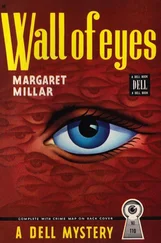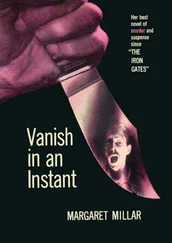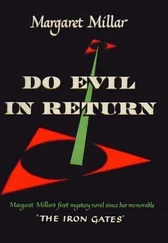“Not tonight. I have to finish some work at the office.”
“We never do anything together anymore, never go to the beach club or the country club; we never even have breakfast together.”
“I can’t afford to sleep until noon,” he said. “You used to have interests of your own, Zan, golf, tennis, bridge. Have you given them all up?”
“Tennis tires me out. And I can’t sit all afternoon at a bridge table or stand around a golf course watching a bunch of bitchy women cheat on their scores. Maybe we could take a trip together, Charles. Paris or someplace exotic like Morocco?”
“When this case is ended, maybe.”
“When this case is ended, there’ll be another case,” she said with bitter truth. “There’ll be no Paris, no Morocco. Hell, we won’t even get as far as L.A. Why don’t you level with me?”
“All right. There probably won’t be a Paris or Morocco, but I’m sure we’ll be able to get down to L.A. once in a while.”
“Oh, wow. Big deal.”
“It’s the biggest I can offer right now.”
He poured her some more bourbon. This time she was able to hold the glass herself, not steadily but well enough to drink from it. The liquor didn’t have the effect he’d hoped for, of making her change the subject.
She said, “A month ago, when you went to the Virgin Islands, you didn’t even tell me in advance. Were you afraid I’d invite myself to go along?”
“It never occurred to me.”
“Of course not. The Virgin Islands is a honeymoon spot. Why should you take me when you had Gunther along?”
“It was a business trip. We were there two days.”
“Oh, a lot can happen in two days.”
She made many snide references to his relationship with Gunther. He denied nothing, admitted nothing, treating her like a child whose tantrums would go away if they were ignored.
“Just answer one question, Charles, will you?”
“I’ll try.”
“Why did you marry me? Why in hell did you marry me?”
She unfolded herself from the couch, a pile of bones suddenly articulated into a skeleton. She walked unsteadily toward the doorway, and he knew where she was heading, to her bedroom and whatever drawer she had hidden the pills in — the medicine chest in the bathroom would be too obvious. He knew he couldn’t stop her and he didn’t try.
She walked out into the hall, her heels ticking on the parquet floor like the clock of a time bomb.
When he went back to the office, he told Gunther about the scene.
“Well,” Gunther said, “why did you marry her?”
“She was very pretty and sort of defenseless. She kept phoning me, asking my advice on investing in this or that and what was the difference between a stock and a bond and so on. Finally she invited me to a party at her house. Afterward we made love in the back seat of her father’s Rolls-Royce.”
“Cute. Classy, too.”
“Then later she told me she was pregnant. I was not only gullible in those days, I was actually rather flattered, even intrigued by the idea of having a kid. Of course, the kid never materialized and probably never existed. She didn’t want children... Did you ever think you might like a family, Gunther?”
“Hell, I had a family. There were twelve of us. We were always hungry, always fighting. My old lady died trying for thirteen, and my old man went off on a religious binge and disappeared into some obscure cult. Nobody ever saw or heard from him again.” Gunther’s laugh was bitter with remembered rage.
Donnelly nodded. When he had first rented the office, he used to have his diplomas and credentials framed and hung on the wall, a cum laude here and a cum laude there. After a few months he took them all down. They made him self-conscious, and anyway his clients weren’t usually the kind to be impressed by pieces of paper printed in Latin; a lot of them couldn’t read any language at all.
“I’m not smart enough to know what I want,” Donnelly said. “But I’m smart enough to know what I don’t want, and that’s some guy sitting on my desk kicking the side of it with his heels. Can’t you sit in a chair like a normal person?”
“So that’s what normal people do, they sit in chairs. Anything else?”
“They show respect towards their boss.”
“That part’s going to be tougher, especially if the boss is in a lousy mood. I think I can handle the sitting okay. Is this right?” He turned a chair around, straddled it and leaned against the back with his chin on his forearms. “Is this how normal people do it?”
“Cut out the crap and get down to business.”
“All right. I’m driving to Bakersfield tonight. I still think Mrs. Pherson sounds too good to be true. And if she sounds too good to be true, she probably is. I’ll find out. I’ve got a date with her maid, Lucy. Lucy wants to better herself. She goes to night school, which is the reason why we’ve got a late date. I’m taking her to the Kern County Boll Weevil Barbecue.”
“The what?”
“The Boll Weevil Barbecue is put on by a bunch of cotton growers and they don’t barbecue boll weevils; they barbecue steak and ribs.”
“What’s the plan, to ply Lucy with food?”
“That shouldn’t be necessary. She’s naturally talkative, and she likes the intellectual type.”
“Is that what you are?”
“The glasses help.”
Donnelly leaned back in his chair and stared up at the ceiling. It was as blank as the walls except for one tiny round spot about the size of the peephole often put in the front doors of residences. He knew it couldn’t be a peephole — his office was on the top floor of the building, which had a tile roof — but he was sometimes acutely conscious of it and altered his actions to meet its approval.
“I suggest you begin your trip now,” he said.
“Jeez, you really are in a lousy mood. I need money.”
“Use your credit cards.”
“The boll weevil boys don’t cotton to credit cards... Hey, smile. That was a funny.”
“Indeed? I have about a hundred cash. You can buy a lot of steak and beer for a hundred. And maybe a lot of Lucy.”
“Not Lucy. I said, she wants to better herself.”
“What’s she look like?”
“Like she needs bettering. Eyes blue, hair brown, measurements nice. Oh, yes, and her father doesn’t own a Rolls-Royce; he owns a Ford van. Not as classy but more comfortable.”
“I’m sorry I told you about the Rolls-Royce... You’re going to be even sorrier if you ever mention it again.”
Donnelly opened his eyes and rubbed them, but the mark on the ceiling remained unerasable. Gunther was at the door, and Donnelly called him back.
“Wait a minute. See that little circle up there just left of center?”
“Yeah.”
“What do you suppose it is?”
“A bug. I mean, a bug bug, not an electronic bug.”
“It never moves.”
“So it’s a lazy bug.”
“No, it’s not a bug at all. It’s my conscience. I guess you’d call it my conscience.”
“You have a very tiny conscience.”
“It only looks tiny. In that small space I see all the thousands of eyes that have stared at me in disapproval and the thousands more waiting their turn.”
“Have it painted over,” Gunther said. “Or cover it with tape.”
“I’d still know it was there.”
“Well, what do you expect me to do about it?”
“Nothing. You’re the last person in the world I’d ask to do anything about it. Those eyes are looking at you, too.”
“Jeez, I can’t stand all this heavy stuff. I’d better get going.”
“When will you be back?”
“Day after tomorrow. I should arrive about the time court convenes.”
“Good. Dr. Woodbridge will be on the stand, their pathologist. He’ll spend at least an hour listing his credentials and adjusting the projector and screen. Maybe the jury will be impressed by all that, but they won’t be impressed by him. He talks very slowly and hesitatingly as if he isn’t sure of his facts. And of course, he isn’t. Pathology is not an exact science, and there’s nothing one pathologist enjoys more than to disagree with another pathologist. That’s why we’re paying big bucks to bring in Thorvald from Minneapolis and Nesbitt from Baltimore.”
Читать дальше
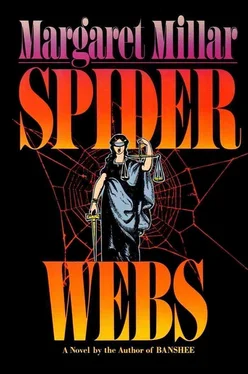

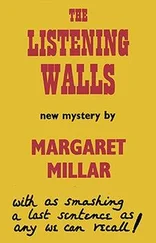




![Маргарет Миллар - Rose's Last Summer [= The Lively Corpse]](/books/384369/margaret-millar-rose-s-last-summer-the-lively-c-thumb.webp)
